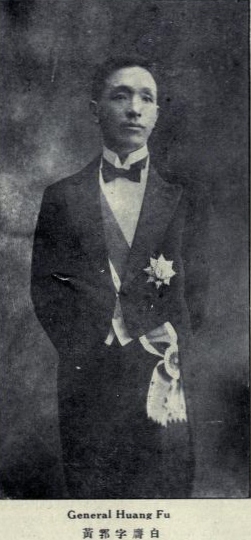Who's Who in China (3rd edition)/Huang Fu

General Huang Fu
黄郭字膺白
General Huang Fu was born at Hangchow, Chekiang province, in 1883. He was given a thorough education in Chinese during his youth. General Huang received his military education first in the Provincial Military School of Chekiang; then at the Chun Wu Academy, the Military Preparatory School Japan; and finally at the Military Survey Academy, Tokyo, where he graduated with honor in the winter of 1910. General Huang returned to China in 1911. In 1911 the Imperial Ching government planned a big manoeuvre to be held at Yung Ping Fu, inside Shankaikuan, in October General Huang who was known as he having made many friends among the revolutionary leaders while he was in Japan, was then sent by the Peking General Staff as military intelligence agent at Shanghai. Upon reaching Shanghai, General Huang joined the late General Ch'en Chi-mei who declared independence at Shanghai with himself as Tutu. General Huang was his Chief Staff Officer. Besides this post, General Huang held many other important positions in connection with the First Revolution, such as Chief Superintendent of the Military Transportation Headquarterss of the Revolutionary Force; Chief Staff Officer to the late Marshal Huang Hsin, Chief Executive Protemp in Nanking; Civil Governor of Kiangsu; Commander-in-Chief of the 23rd Division; Director in charge of the disbandment of the revolutionary troops. In the summer of 1913 the Second Revolutionary broke out against Yuan Shih-kai. General Huang participated in the capacity of the Chief Staff Officer to General Ch’en Chi-mei who again made Shanghai a base for the revolutionary movements. Finally the second Revolution was clashed by Yuan Shih-kai’s troops. General Huang, like other revolutionary leaders, whose arrest was ordered by the Peking government, had to take flight from China. He first went to Japan. Early in 1914 General Huang went to America, where he remained for one year after which he went to Singapore where he also stayed for a year. After the death of Yuan Shih-kai, in June 1916, he returned to China and accepted the position of the representative of the Chekiang Military Governor in Peking which position he is still holding. During 1917-1920 General Huang made his home at Tientsin. In the first two years he devoted his whole energy and time in writing articles regarding what he had seen and learned during his sojourn in foreign countries. He wrote two books in Chinese entitled “Lessons from the European War and the Future of China" and "The World after the War.” While residing in Tientsin he gave a series of lectures on the international questions at the Nanking College. During the year 1920-21, General Huang was assisting the ex-President Hsu Shih-chang in writing a book called "China's Finance and Education after the European War.” At the same time he was also a Director of the Government Economic Investigation Bureau. in November 1920 he was conferred the Second Class Tashou Chiaho Decoration. In the summer of 1921 General Huang went to Europe and America on a semi-official mission to study post-war financial conditions. He was in America when the Washington Conference was convened in November 1921. The Peking government appointed him Advisor to the Chinese Delegation while he was also serving as Hsu Shih-chang's personal representative. Before the convention of the Washington Conference, he wrote a book on "The Initiation of the Washington Conference and its Tendencies." What he had anticipated in this book was realized. General Huang left Washington before the close of the Conference and went to Europe, where he travelled for about half a year and then returned to China. In July 1922 General Huang was conferred the Second Class Wenha Decoration and in August he was made a Chiangchun with the title "Chu-Wei." In September he was appointed Special Deputy to make preparations for the organization of a Financial Commission to straighten up the fiscal affairs of the country. In October he was awarded the Second Class Paokuang Chiaho Decoration. In February 1923 General Huang was appointed Acting Minister of Foreign Affairs which position he held only for two months. He received the First Class Tashou Paokuang Chiaho Decoration in the same month. In March he became concurrently President of the Diplomatic Commission. In September 1923 General Huang was appointed Acting Minister of Education which position he held until January 1924. Since that time, he devoted himself in giving lectures in several of the universities in Peking and also at the headquarters of General Feng Yu-hsiang's troops of Nanyuan, Peking. In September 1924 General Huang became Minister of Education in Dr. W. W. Yen's Cabinet. This position he is still holding.

